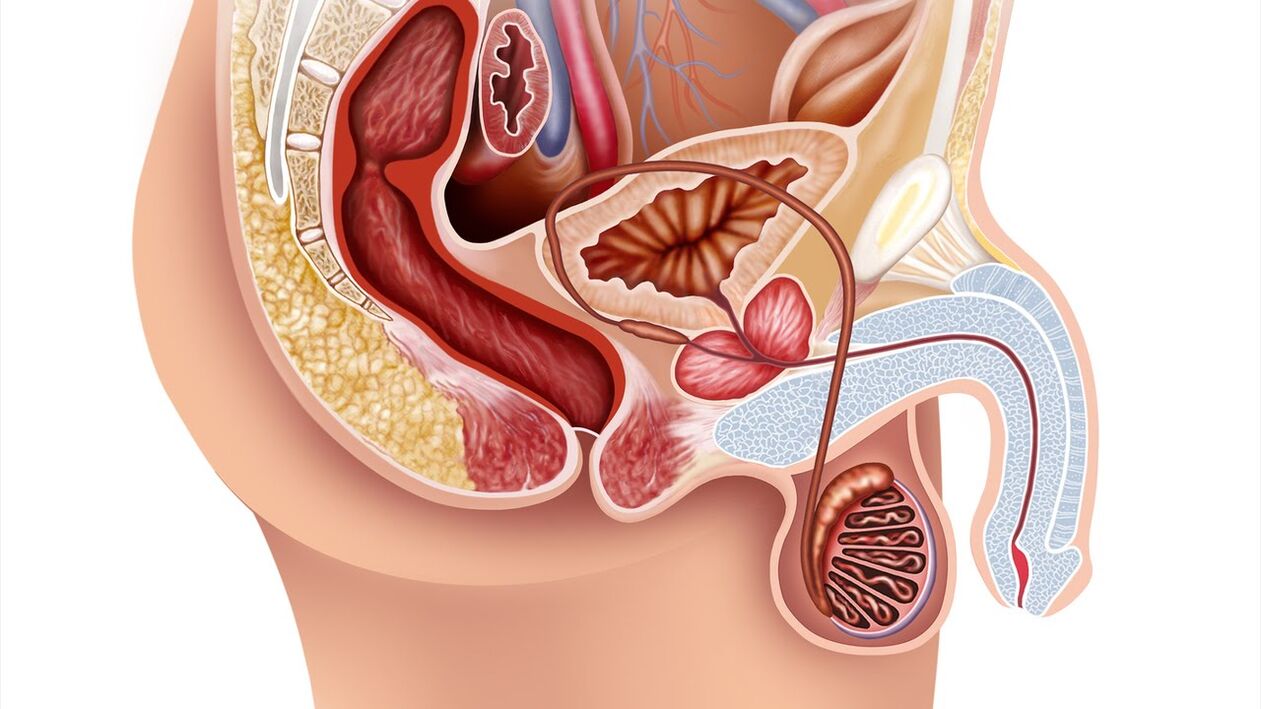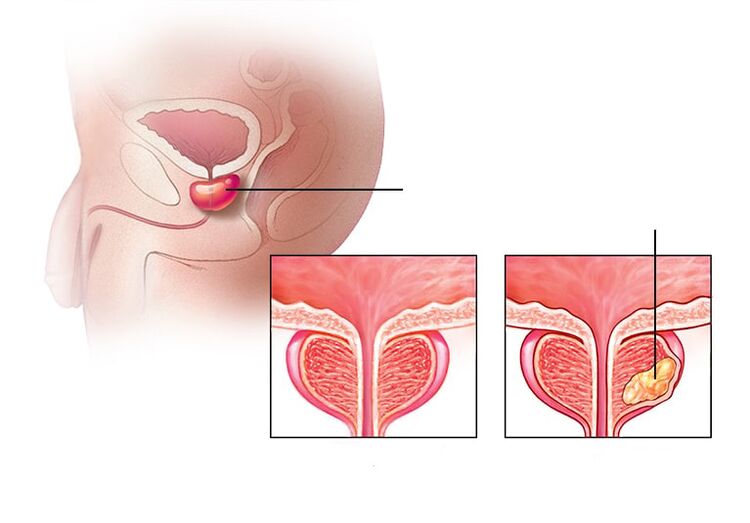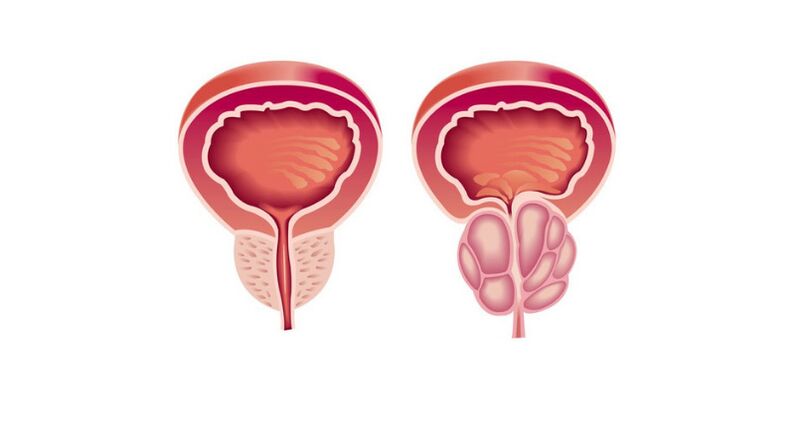
Prostatitis is an inflammatory process involving inflammation of the prostate gland (prostate gland) in men. Usually this disease occurs in men over the age of 30. This disease causes pain in the lower back, perineum or pelvis, which is accompanied by a violation of the normal process of urination and, in severe forms, leads to erectile dysfunction and serious problems in the penis. relationship with your partner.
About a quarter of couples have infertility, which is mainly due to male factors affecting the ability to conceive. Male infertility is a violation of the quality of sperm and their quantity in the ejaculate.

Prostate (prostate) refers to the male reproductive system. It is shaped like a chestnut, located in front of the rectum, below the bladder, and around the urethra (urethra). When the prostate becomes inflamed, it puts pressure on the urethra, which in turn leads to urinary problems. The main function of the prostate gland is to produce a secretion (liquid) that is part of semen and dilute it, ensuring normal sperm motility.
Prostatitis is very common in the practice of a urologist. It can happen suddenly or gradually, be continuous and long-lasting (chronic prostatitis). The chronic form of this disease is more common than the acute form. Chronic prostatitis ranks fifth among 20 major urological diagnoses.
Since prostatitis is an active focus of infection in the body, it requires mandatory treatment, even if its symptoms do not bother you.
Reasons for developing prostatitis
The list of causes of prostatitis is diverse:
- diseases of the genitourinary system (cystitis, urethritis, pyelonephritis);
- sexually transmitted infections (trichomoniasis, gonorrhea);
- infections associated with pneumonia, flu, tonsillitis, boils;
- chronic constipation, which forces a man to strain frequently;
- sedentary lifestyle and irregular sex life lead to stagnant stagnation;
- urinary retention - swelling of the bladder increases pressure on the prostate gland;
- frequent hypothermia (or overheating);
- trauma to the pelvic region;
- Hormonal disorders weaken the immune system.
Very often, the occurrence of prostatitis is caused by pyogenic bacteria: E. coli, streptococci and staphylococcus, mycoplasmas, Candida, Trichomonas, tuberculosis bacilli. They multiply very rapidly and destroy prostate tissue, manifesting as inflammation.
In most cases, the presence of prostatitis causes the infection to enter the prostate gland through the urethra. It occurs when it enters the body through the blood or lymph, traveling from the bladder or rectum.
Importance! Impaired immunity is very dangerous for patients with chronic prostatitis, because the prostate gland quickly becomes inflamed due to fatigue, stress, lack of sleep, malnutrition and other adverse factors. .
With a sedentary lifestyle and no regular sex life, the blood supply to the pelvic organs is poor, leading to starvation and congested prostate tissue. Stagnation is an ideal environment for the growth of pathogenic microorganisms that cause inflammation.

Types and forms of prostatitis
Prostatitis, depending on the cause of the disease, is classified into forms and forms:
By type, they are distinguished:
Bacterial prostatitis- Inflammation due to infection. Bacterial prostatitis occurs in both young and elderly men.
congestive prostatitis- inflammation due to stagnation of secretion. It develops in men with a sedentary lifestyle who do not have a regular sex life. This form can be rapidly replenished during infection, and then the stagnation is complicated by the bacterial form.
Prostatitis- Stones form in the prostate gland. Untreated chronic prostatitis can cause this complication. This disease affects older men who do not follow the advice of a urologist.
According to the form of the flow, they are distinguished:
Acute form of prostatitisThis is an inflammatory condition of the prostate gland caused by an infectious agent, characterized by the appearance of edema and foci of pus in the tissues. 30-58% of men of reproductive age (30-50 years old) face such a diagnosis.
Chronic prostatitischaracterized by persistent or recurrent urogenital symptoms due to bacterial infection of the prostate gland. The chronic form accounts for 10% of all cases of prostatitis.
Symptoms of Prostatitis
Sharedsymptoms of prostatitisto be:
- pain in the lower back;
- discomfort during bowel movements;
- pain in the perineum or pelvis;
- disorders in the work of the lower urinary tract.
The acute phase of prostatitis is accompanied by a general intoxication syndrome. This disease is characterized by a clear manifestation of symptoms with a vivid clinical picture:
- sharp rise in body temperature, chills, nausea, vomiting and irritability;
- pain syndrome and chills in the joints and muscles;
- an increase in the size of the prostate gland and the appearance of discomfort in the perineal area;
- frequent urination and urinary retention.
Against the background of individual inflammatory processes, a purulent infection can develop that affects the blood. In such a situation, the patient requires urgent hospitalization: with sepsis, treatment of prostatitis should be carried out exclusively in the clinic.
Inchronic prostatitis of a bacterial naturesymptoms are often absent, so treatment begins only when an infection in the urinary system is detected, the manifestation of which is against the background of a complication of the disease. In this case you can observe:
- pain during ejaculation;
- the appearance of blood in the ejaculate;
- the presence of discharge from the urethra;
- Erectile dysfunction may develop.
If the examination does not show that the chronic pain is due to a prostate problem, then in this case we are dealing withChronic non-bacterial prostatitisor the so-calledchronic pelvic pain syndrome. With this disease, a man's quality of life is significantly reduced, as it leads to various disorders of a psychological and sexual nature:
- increased fatigue;
- feeling useless;
- erectile dysfunction;
- painful ejaculation;
- pain after intercourse, etc. v.
The same symptoms may apply to other urological diseases, so prostatitis cannot be diagnosed by symptoms alone. For example, dysuria and pain are present in prostate tumors, cystitis, various cancerous tumors of the genital organs, etc. v.
Diagnosis of prostatitis
Having identified the first signs of an inflammatory process of the prostate gland, the patient should immediately contact a doctor - a urologist. The doctor must rule out many diseases with similar manifestations, and determine which disease it belongs to.
To confirm that the patient does not have other diseases (for example, appendicitis, cancer, inflammatory processes in the bladder and kidneys, prostate tumor), the doctor must carry out the necessary examinations:
- history collection (ask the patient);
- General inspection;
- Rectal examination;
- research on the secret of the prostate gland;
- analysis of sexually transmitted diseases;
- Ultrasound examination of the prostate, scrotum, and pelvic organs.
At the appointment, the urologist should clarify with the patient the duration of the clinical presentation, localization, and nature of the pain (eg, perineal, scrotal, penile, and inner thighs), characteristic changes of spermatozoa (presence of pus and blood).
The physician establishes the diagnosis of chronic bacterial prostatitis with a symptomatic duration of at least three months.
The survey will include:
- Digital rectal examination of the gland, to determine the degree of prostate enlargement and its consistency.
- Analysis of prostate secretion, urine and/or ejaculation.
- Identify urogenital infections.
- Urodynamic studies.
- Ultrasound examination of the urinary system (kidneys, prostate, bladder with residual urine).
- Culture study of prostate secretion and microscopic examination of different parts of urine and prostate secretion.
- Androflor is a comprehensive study of microbiocenosis of the urogenital tract in men by PCR, which will determine the qualitative and quantitative composition of the microflora.
After determining the cause of the disease, the doctor will prescribe a course of treatment. It must be remembered that standard methods can only detect infection in 5-10% of cases, which eventually leads to prostatitis.
The patient must definitely go through a thorough diagnostic process, because the success of the treatment will depend on the accuracy of the results.
Prostatitis treatment
Only when a urologist has diagnosed and determined the cause and form of prostatitis, treatment will be prescribed.
The leading role in the treatment of this disease is assigned to drug therapy:
Antibacterial therapy
At the first stage of therapeutic therapy, it is necessary to eliminate inflammation. Antibiotics are the mainstay of treatment for acute bacterial prostatitis and are recommended for chronic bacterial prostatitis. Your doctor chooses an antibacterial drug depending on what type of bacteria is causing the illness. Patients will have to take oral antibiotics for 4-6 weeks. Chronic or recurrent prostatitis takes longer to resolve. Hospitalization for very severe symptoms may be required, where a course of intravenous antibiotics will be given. Usually, this occurs with acute bacterial prostatitis.
Treatment with alpha1 . blockers
When you have difficulty urinating, your doctor prescribes alpha1 blockers, which make it easier to urinate and relax the muscles of the prostate and bladder. Muscle relaxants will relieve the pain of prostate swelling that puts pressure on nearby muscles. Non-steroidal anti-inflammatory drugs will help reduce the pain syndrome.
In addition, the doctor can prescribe auxiliary drugs: biostimulants, extracts of various plants and insects in the form of rectal suppositories. Unfortunately, the use of drugs alone in the treatment of prostatitis is not sufficient.
In the treatment of this disease, the principles of the sequence of actions must be observed. Treatment of prostatitis is always complicated.
Physiotherapy in the treatment of prostatitis
In chronic types of prostatitis, you can additionally use physiotherapeutic methods:
- prostate massage (prostate);
- laser therapy;
- hyperthermia by microwave and thermotherapy;
- electrical stimulation with a modulated current with transdermal or rectal electrodes;
- acupuncture (acupuncture).
Alternative methods, such as hirudotherapy (medical leech therapy), are sometimes used to treat prostatitis, but its effectiveness and safety have not been established. .
Introducing stem cells
Cell therapy (stem cell injection) is a promising approach in the treatment of prostatitis at present, it is in the early stages of development. Regarding the injection of stem cells into the prostate, one can only hypothesize its mechanism and the experimental data obtained by individual groups of researchers.
Surgical treatment of prostatitis
Surgery is used to treat complications of prostatitis (abscess and compression of the seminal vesicles).
Treatment of chronic pelvic pain syndrome requires individual considerations. Asymptomatic inflammatory prostatitis does not require treatment.
Diet and lifestyle for prostatitis
Prostatitis does not require a special diet, but eating a large amount of vegetables, lean meats and dairy products will help improve bowel function. Need to nourish the body with enough fiber, foods rich in vitamin E (wheat germ, corn oil, . . . ), replace sugar with natural honey. Proper nutrition when suffering from prostatitis will help improve bowel function and reduce the possibility of recurrence or speed up recovery. Patients need to limit coffee, don't drink alcohol, drink plenty of water and follow a healthy lifestyle.
Preventive measures to prevent prostatitis
When a man leads a right lifestyle: he follows a proper diet, does exercise, the chances of developing chronic prostatitis are very small. Refusing bad habits and having normal sex is the way to prevent this disease.
Importance! There are primary and secondary prevention to prevent the development of prostatitis in men.
Elementary school- to prevent the occurrence of diseases. It includes maintaining a balanced diet, physical activity regime, timely treatment of infectious diseases of the body and regular protected sex, etc. v.
Middle School- aims to prevent recurrence of existing chronic prostatitis and to provide urologist with routine examination and prophylactic treatment with multivitamins, restorative and sports medicine.



























